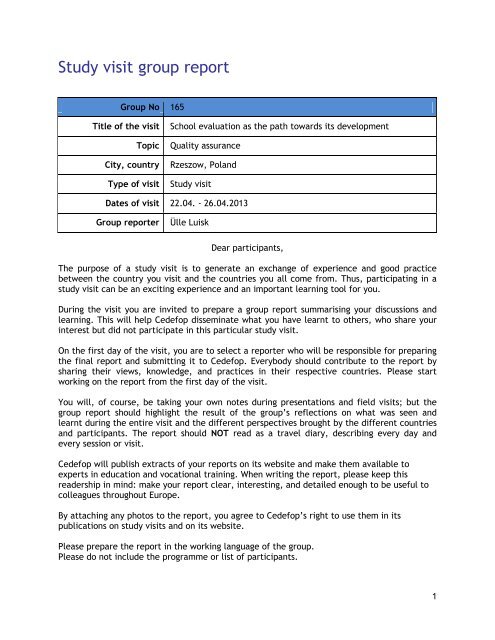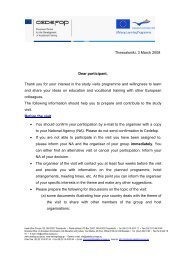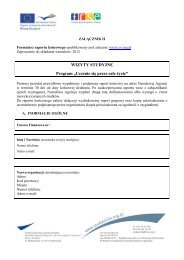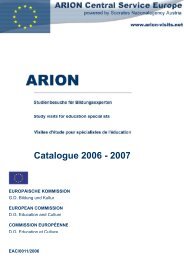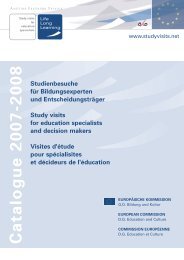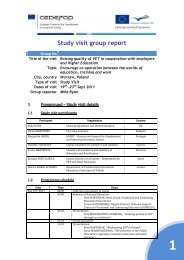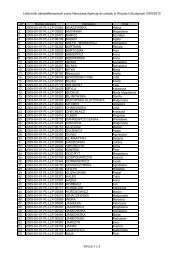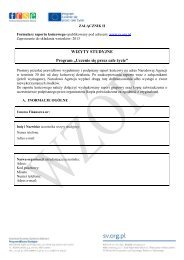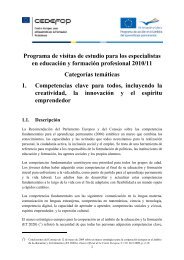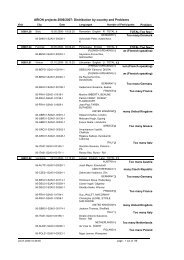Study visit group report
Study visit group report
Study visit group report
- No tags were found...
You also want an ePaper? Increase the reach of your titles
YUMPU automatically turns print PDFs into web optimized ePapers that Google loves.
<strong>Study</strong> <strong>visit</strong> <strong>group</strong> <strong>report</strong>Group No 165Title of the <strong>visit</strong>TopicCity, countryType of <strong>visit</strong>School evaluation as the path towards its developmentQuality assuranceRzeszow, Poland<strong>Study</strong> <strong>visit</strong>Dates of <strong>visit</strong> 22.04. - 26.04.2013Group <strong>report</strong>erÜlle LuiskDear participants,The purpose of a study <strong>visit</strong> is to generate an exchange of experience and good practicebetween the country you <strong>visit</strong> and the countries you all come from. Thus, participating in astudy <strong>visit</strong> can be an exciting experience and an important learning tool for you.During the <strong>visit</strong> you are invited to prepare a <strong>group</strong> <strong>report</strong> summarising your discussions andlearning. This will help Cedefop disseminate what you have learnt to others, who share yourinterest but did not participate in this particular study <strong>visit</strong>.On the first day of the <strong>visit</strong>, you are to select a <strong>report</strong>er who will be responsible for preparingthe final <strong>report</strong> and submitting it to Cedefop. Everybody should contribute to the <strong>report</strong> bysharing their views, knowledge, and practices in their respective countries. Please startworking on the <strong>report</strong> from the first day of the <strong>visit</strong>.You will, of course, be taking your own notes during presentations and field <strong>visit</strong>s; but the<strong>group</strong> <strong>report</strong> should highlight the result of the <strong>group</strong>’s reflections on what was seen andlearnt during the entire <strong>visit</strong> and the different perspectives brought by the different countriesand participants. The <strong>report</strong> should NOT read as a travel diary, describing every day andevery session or <strong>visit</strong>.Cedefop will publish extracts of your <strong>report</strong>s on its website and make them available toexperts in education and vocational training. When writing the <strong>report</strong>, please keep thisreadership in mind: make your <strong>report</strong> clear, interesting, and detailed enough to be useful tocolleagues throughout Europe.By attaching any photos to the <strong>report</strong>, you agree to Cedefop’s right to use them in itspublications on study <strong>visit</strong>s and on its website.Please prepare the <strong>report</strong> in the working language of the <strong>group</strong>.Please do not include the programme or list of participants.1
The <strong>report</strong>er should submit the <strong>report</strong> to Cedefop (study<strong>visit</strong>s@cedefop.europa.eu) withinONE month of the <strong>visit</strong>.I FINDINGSThis section summarises the findings of the <strong>group</strong> while <strong>visit</strong>ing host institutions, discussingissues with the hosts and within the <strong>group</strong>. You will be reflecting on what you learnt everyday. But to put them together and give an overall picture, you need to devote a specialsession to prepare the final <strong>report</strong> on the last day of the <strong>visit</strong>.In this section, it is important that you describe not only things you learnt about the hostcountry but also what you learnt about the countries represented by <strong>group</strong> members.1. One of the objectives of the study <strong>visit</strong>s programme is to exchange examples of goodpractice among hosts and participants. Cedefop will select well-describedprojects/programmes/initiatives and disseminate them to former participants and awider public, including potential partners for future projects. Therefore it is importantthat you identify and describe all aspects that, in your view, make theseprojects/programmes/initiatives successful and worth exploring.<strong>Study</strong> <strong>visit</strong> was an excellent possibility to exchange our experiences about the school qualityand school evaluation and to identify both, differences and similarities.Describe each of the good practices you learnt about during the <strong>visit</strong> (both from the hosts andfrom one another) indicating the following:2
title of theproject/programme/initiativeCountryname of the institution thatimplements it (if possible, provide awebsite)contact person(if possible)who presentedtheprogramme tothe <strong>group</strong>whom theproject/programme/initiativeaddresseswhat features of theproject/programme/initiative make it an exampleof good practiceSchool evaluation inPolandPoland Kuratorium Oswiaty Hanna Statisca Rzerszow External evaluation as theinnovative practiceSchool <strong>visit</strong> Poland Gimnazjum No. 1 in Przeworsk Headmaster Przeworsk,PolandCooperation betweentarget <strong>group</strong>s in school aspart on internalevaluationDiagnostic evaluation:external and internalassessment in BalearicIslandsSpainConselleria d’Educacio de les IllesBalearshttp://weib.caib.esMarina AnaGasull CaulesPrimary andSecondarySchoolSchool improvementSelf evaluaion Slovenia Gimnazija Novo mestowww.gimnm.orgMojca Luksicsecondaryschoolschool self improvement,students are assessingteachersEvaluation System inPrimary Education inCyprusCyprusMinistry of Education and Culture ofCypruswww.moec.gov.cyPanayiotisKyrou-SchoolEvaluation-School SelfEvaluation-Teachers’assessment-School Improvement-Teachers’ AssessmentSchool Evaluation in METUDF Schools in TurkeyTurkey METU DF Schools Pelin Asan School system School Evaluation has anstrong impact on schoolsdevelopment. Butstrategic plan is importantpart of it.3
title of theproject/programme/initiativeCountryname of the institution thatimplements it (if possible, provide awebsite)contact person(if possible)who presentedtheprogramme tothe <strong>group</strong>whom theproject/programme/initiativeaddresseswhat features of theproject/programme/initiative make it an exampleof good practiceEvaluation of theeducational work - Schoolself-evaluationGreeceMinistry of Education and ReligiousAffairs, Culture And Sports,http://www.iep.edu.gr/site/index.php/el/evaluationSofia SaitiPre- primary,primary andsecondaryeducationSchool improvement,School unit plays the mainrole and is the protagonistin the evaluation process.Institude of Educatioanal Policyhttp://www.iep.edu.gr/site/index.php/el/evaluationExternal and internalevaluation of schoolEstoniaMinistry on Education and Researchwww.hm.ee/enÜlle LuiskViljandiGymnasiumObjectives of the nationalsupervision1)To examine theeducational activitiesrelating to regulatoryacts.2)To analyze the problemsof implementationlegislation on theactivities teaching andlearning process.internal and externalschool evaluation inBavariaGermany(Bavaria)ISB Qualitäts- agentur Münchenwww.isb.bayern.deMichaelSchefcsikall schooltypes inBavaria forexternal andvery well structured,internal and externalevaluation with the samemethods and instruments,4
title of theproject/programme/initiativeCountryname of the institution thatimplements it (if possible, provide awebsite)contact person(if possible)who presentedtheprogramme tothe <strong>group</strong>whom theproject/programme/initiativeaddresseswhat features of theproject/programme/initiative make it an exampleof good practiceinternalevaluation10 years of experiencewith external evaluationHessisches Qualitätsentwicklungund Evaluation(external and internalevaluation in Hessen)Germany(Hessen)www.iq-hessen.deChristopherTextorHessischerReferenzrahmenSchulqualitätits on the internet,withmany tools.QIBB Austria www.qibb.at FranzLITZLBAUERschool evaluation France ministry for Education FlorenceLLOPISVocationaleducationunitssecondaryschoolits on the internet, veryeasy to handle,with abenchmark to otherschoolsschool improvment byevaluationRomania Ministry of National Education Cristina MariaIvanpreprimary,primary,secondaryschoolRomanian Agency forQuality Assurance inSecondary EducationEvaluation ofschooEvaluation of schoolsin RomaniaRomaniaARACIP (Romanian Agency for QualityAssurance on Pre-University Education /ARACIP in Romanian language)www.aracip.edu.roCostacheFlorentina-Flori- AllRomanianSchools, bothstate andprivatepiloting of the Manual ofinternal assessment byARACIP5
2. The study <strong>visit</strong>s programme aims to promote and support policy development andcooperation in lifelong learning. That is why it is important to know what you learnt aboutsuch policies and their implementation during your <strong>visit</strong>. You are invited to describe yourfindings concerning the following:2.1 APPROACHES TAKEN BY PARTICIPATING COUNTRIES (BOTH HOST AND PARTICIPANTS’)REGARDING THE THEME OF THE VISIT. ARE THERE ANY SIMILAR APPROACHES/MEASURES INPARTICIPATING COUNTRIES? WHAT ASPECTS ARE SIMILAR AND WHY? WHAT ASPECTS AREDIFFERENT AND WHY?All participant countries do have some kind of evaluation of school system based on lawsand/or educational acts. Internal evaluation could be found in every country. Externalevaluation is not established in all participant countries.Following table shows more details about school evaluation in the participant countries.6
Country Law Institution/agents Sources/toolsAustriaEstoniaNo law butthe ministrygives arecommandationLaw (Levelsare: Act ofcovernment -> Regualtionof ministry ->Decree ofheadmasterof theschool). Acts:TheConstitution(the provisionof educationis supervisedby the state);EducationAct,Basic SchoolandGymnasiumAct, ThePublicInformationAct (aboutpublishingresults). Bothexternal andinternalevaluationA department of theministry - qibbMinistry of Educationand Research,Foundation Innove(shall be exercisedby the Ministry ofEducation andResearch), Localauthority, School.Questionform onlineTest, state exam,questionnaire,interview,observation.methods (Rating,assessment,control)Frequency andperiodThere is no controll There aredifferent types ofevaluationtopics,they changeevery yearComparing theresults of the stateexams, awardingprograms offeredby partners ofministry (forexample award of"Values EducationSchool", issued bythe Centre forEthics at Univesityof Tartu).EXTERNAL:according topriorities everyyear in selectedschools.Priorities andselected schoollist are given bythe ministryregualtion everyyear. Stateexams everyyear. INTERNAL:Planned inschools for 3years.Kinds of<strong>report</strong>s (Ratingsystem, Publicornot Presentedto whom)Some of theevaluation ismentioned in theyearlyquality<strong>report</strong>,which is on thehomepageEXTERNAL:Statement in notpublic.Monitoringevaluationresults will beprovided on aseparateevaluationstatement foreach educationalinstitution.County governorshall submit thetranscript toschool within 15working daysafter the end ofthe evaluationactivities. Schoolmay, within 3working days topropose astatement forspecification.County governorforward the copyof the digitallysignedBenefitsThe individualevaluation isgood foryourself and theschoolevaluationis good if youcan compare itwith otherschoolsThe extenralevaluation isthe tool forcoverment toget inforamtionabout level oflearningoutcomes andalso abouttopics whichneed to bedeveloped inthe future.Internalevaluation israisedsignificantly thecompetenceslevel of schoolleaders indevelopment oftheorganisation.Evaluationhelps toimplement thegoals ineducationalpolicy.AdditionalideasThe evaluationin school is verydifficult,because youhave to do itwith quitedifferent humanbeings and notwith productsEvaluate toachieve!7
Country Law Institution/agents Sources/toolsaremandatory.methods (Rating,assessment,control)Frequency andperiodKinds of<strong>report</strong>s (Ratingsystem, Publicornot Presentedto whom)statement to theeducationalinstitution, localgoverment andMinistry ofEducation andResearch within60 calendardays of theevaluation startdate. To 20th ofJune in everyschoolyear thecounty governorwill send thecommonowerview aboutexternalevaluations incounty schools.INTERNAL:Internalevaluation ismandatory forschools from01.09.2006. Aneducationalinstitution shallprepare theinternalevaluation <strong>report</strong>at least onceevery threeacademic years.The internalevaluation musttake account ofthe MinistryBenefitsAdditionalideas8
Country Law Institution/agents Sources/toolsCyprusGermany(Bavaria)Yes there is alawBavarian Law(BayEUG)MinistryQuality Agency atISB (Bavarian StateInstitut for SchoolQuality)Report forteachers'evaluation.Report ofheadteachers'evaluationmethods (Rating,assessment,control)Control by theministry throughthe inspectors.Once every threeyears a team ofthree inspectors<strong>visit</strong> the school forone day and afterthe headteacherand the schoolevaluation theyinform the teachersabout theirpossitive andnegativecomments.Assessment ofrequirements,rating of criteria, nocontrol systemFrequency andperiodA. The team ofthree inspectors<strong>visit</strong> the schoolonce every threeyears in one-day<strong>visit</strong>. B. Theschool inspector<strong>visit</strong> the schoolvery often,he/she talks withthe headteacherand teachersabout the everydayschool work,aboutinnovations, theschoolimprovementplan, solvingproblems, toadvise theheadteacher andthe teachers andto evaluateteachersEvery 5 years, 3days school <strong>visit</strong>Kinds of<strong>report</strong>s (Ratingsystem, Publicornot Presentedto whom)regulation of preschools,primaryschools,secondaryschools, andvocationalperformanceactionfiealdsindicators.34 "CollegeNationalSurveillancePriorities,Thematicconducting statesupervision, theBenefitsBasis for schooldevelopmentand targetagreement,Additionalideasfocuses on theevaluation ofteachers.emphasis onthe teachers'selection ratherthanimprovement ofthe teachingstaff and thepromotion ofeducationalwork. Improvingself evaluation.Improvement ofthe schoolexternalevaluation. Thedual role ofinspectors asadvisors andevaluators isbeingquestioned.Internal andexternalevaluation areboth obligatory9
Country Law Institution/agents Sources/toolsFranceEducation Actof 10 july1989Spain LOE 2/2006.Decree72/2008RomaniaThe lawincludes bothexternal andinternal one,LEN 1, 2011For external: DEPPand generalinspectorateFor internal:Headmaster, Recteurand DASEN, regionaland departmentalinspectorateIAQSE (external)DiagnosticEvaluationComission (internalin each school)MINISTRY OFNATIONALEDUCATION,COUNTY SCOOLINSPECTORATEAND ARACIPExternal:questionarriesand <strong>visit</strong> ofschoolmethods (Rating,assessment,control)No ratingFrequency andperiodExternal:independant oftimeInternal: once ayear forpedagogicalactions, all the 3years for regionallevel and aboutall the6-7 yearsfor teachers.Questionnaires Inspectors External andinternal every 2years on4thdegree inPrimary schooland 2nd degreeof SecondarySchoolExternal:observation,questionares,interview,observationlessonsInspectorsInternal:the scoolunit- regular/semestrialExternal: madeby ARACIP -every fiveyears;TheExternal onemade by CountySchoolInspectorateKinds of<strong>report</strong>s (Ratingsystem, Publicornot Presentedto whom)formatting theresults andoutcomesOn line <strong>report</strong> foreach school withits own resultsfor their eyesonly.Anexecutive <strong>report</strong>of generalaspects forauthorities ansit's published online. No rankingsof schools..The <strong>report</strong> madeby MEN or CSIis not public.The<strong>report</strong> made bythe ARACIP`sexperts is public.Benefitsknowlede forauthorities tobuild up supportfor the schoolsExternal:Theresults are usedby Ministry forEucation tocreate new lawto improveschool system.Externalevaluationemergeweaknessesand strenghts,opportunitiesand threats.Identifying thestrengths andweaknesses ofthe institution /diagnoseachieving,making ahierarchy of thequality ofservicesprovided byAdditionalideasand are part ofa quality circleExternal: nofeed back fromInstitution toschoolevaluatedSchools mustknow who theyare, who theywant to be, andwhat they wantand can do. toachieve. itThe externalevaluatin madeby RomanianAgency forQualityAssurance inSecondaryEducation -ARACIP -missioninvolves10
Country Law Institution/agents Sources/toolsmethods (Rating,assessment,control)Frequency andperiodevaluates about10 schools onyear.Slovenia questionnaries no rating every year untill31st MarchTurkeyGreeceThere is lawfor publicschools fornowLaw,legislationacts whichfollow theFor external Ministryof Natinal Educationand partners(parents, students,teachers), for internalschool managersand teachersFor external: theMinistry ofEducation, SchoolAdvisor, TheSurvey, selfevaluationtechniques,performance appraisalformInternal:¨Teacherscalendar,¨Photos,Quantitative andqualitativeassessmentno rating. Nocontrol.Quantitative andqualitativeInspectors' <strong>visit</strong>,parents' andteachers' surveyones in two year,students' surveyevery year.Internalevaluation is notsystematical.Performanceappraisal everytermsInternal: It isproposed to bedone every 2years. Till nowKinds of<strong>report</strong>s (Ratingsystem, Publicornot Presentedto whom)self evaluation<strong>report</strong> is publicbut it is not haveto be publishedOnly the result ofparents survey isshared by e-mail. Theperformanceappraisal isshared by theopponentsAt the end ofeach year theschool writes a<strong>report</strong> "GeneralBenefitsschools,Improving ofthe results ofthe activitity,counseling andeducationsupport ofschools ,teachers, andschool stuff toimprove theiractivityyou canimprove thefields theschool wasevaluatingStrong impacton school andpersonaldevelopment.Strong impacton school andpersonaldevelopment.Additionalideasexternalevaluation ofthe quality ofeducation,accreditationand evaluationunits ofpreuniversityeducationthroughinspection anddevelopingstandards,referencestandards andperformanceindicators.we arenottrained forthe evaluationplanning,determiningtarget andoperations arepart of thesytem afterevaluationotherwise it isuselessIf you don'tknow who youare you don'tknov where to11
Country Law Institution/agents Sources/toolslaw, act ofgovernment,decisions ofthe Ministryof Educationand ReligiousAffairs,Cultures andSportspublished inGovernmentGazette,(years 2010,2012, 2013).The internalselfevaluationmodel hasbeenimplementedonly in 550schools pilotbetween2010-2012after a shorttraining of theheadmasters,teachers andschooladvisorswhowereengaged. It isgoing to bebrought ingeneral usefromSeptember2013 and aindependent«Authority for QualityAssurance in Primaryand SecondaryEducation». Forinternal:PrivateLegal Entitysupervised byMinister "Institude ofEducational Policy",School¨Videotaping ofteaching acts,Observation¨Interviews withstudents andparents,¨Observationgrids¨Questionnaires /Socialgram,surveys, stateelectronicdatabases forschools,teacher'smeeetingminutes, parentsmeetingsminutes,Curricullacontent. Itdepends on thearea the schooldecides toinvestigate andimprove.methods (Rating,assessment,control)elements in schoolself-evaluatonFrequency andperiodthe schooladvisor <strong>visit</strong>s theschool often,he/she discusswith theheadmaster andteachers aboutthe every-dayschool work,aboutinnovations,methodologyissues, theschool, solvingproblems, advisethe headteacherand the teachersand proposes.Kinds of<strong>report</strong>s (Ratingsystem, Publicornot Presentedto whom)estimationof the scoolprofile" whichincludes a) theself-evaluationprocess itfollowed - (about200 words) b) adescriptivepresentation ofthe results(100 words forevery index ofquality) and aquantativeestimation,c)the mainresults of theschool selfevaluation,thatis to say, themost importantacheivements ofthe school, theweaknesses andthe areasof theeducational workselected by theschool to beinvastigated indepth. The<strong>report</strong> should bepublished in theschool websiteand the HellenicSchool Net.BenefitsMotivation,feedback on thedesign ofeducationalpolicy,compensatorybenefits, raiseof effectivnessgo!Additionalideas12
Country Law Institution/agents Sources/toolsGermany(Hessen)training of theheadmasterswill takeplace duringthe next 2months.Externalevaluationhas not takenits final formyet. Till nowthere is asupervision ofschools andteachers bythe RegionalDirector ofEducation(adminisrative) and asupervision ofthe teachers'pedagogicalwork by theschooladvisor.Law, act ofgovernment(HSchG,HessischesSchulgesetz)Forexternal:HessischesLandesschulamt undLehrkräfteakadamie(Qualitätsentwicklungund Evaluation), forinternal: schoolExternal:observation,questionares,interview,observationlessons, 97instruments fromthe resorts of"HessischerReferenzrahmenSchulqualität"methods (Rating,assessment,control)Assessment ofrequirements,rating of criteria(HRS, Input,Prozess andOutput, no controlsystemFrequency andperiodEvery 5 years, 2days school <strong>visit</strong>,if worst than 2,0inQualitätsbereichVI Lehren undLernen (teachingand learning)there is a newinspection.Kinds of<strong>report</strong>s (Ratingsystem, Publicornot Presentedto whom)Publishing anintern evaluation<strong>report</strong>, theheadmasterdecidet if itpublished. TheInspectionpublished a<strong>report</strong> of allschools.BenefitsBasis for schooldevelopmentand targetagreement,knowledge forauthorities/administrationto build upsupport for theschoolsAdditionalideasInternal andexternalevaluation areboth obligatoryand are part ofa quality circle(internal:schoolprogramm/ external:evaluation byan inspector.13
2.2 CHALLENGES FACED BY PARTICIPATING COUNTRIES (INCLUDING HOST) IN THEIR EFFORTS TOIMPLEMENT POLICIES RELATED TO THE THEME OF THE VISIT. WHAT ARE THE CHALLENGES?ARE THEY COMMON CHALLENGES? IF SO, WHY? IF NOT, WHY NOT?- It is possible to develope organisation and teachers in school through the evaluation process.- One of the challenge is to implement evaluation process in the way it could be supportivefor school.- It is important to build up the advisory system for developing the internal evaluationeffectiveness in schools.- It is good to involve universities to the process of working out evaluation tools and methods.- It was countries which have just established or changed the external evaluation systemconfronted with challenge to have efficient methods and instruments.- External and internal evaluation leads to quality transformation in schools.- To publish external evaluation results could be dangerous because the results could bemisused by public and media.2.3 NAME AND DESCRIBE EFFECTIVE AND INNOVATIVE SOLUTIONS YOU HAVE IDENTIFIED THATPARTICIPATING COUNTRIES (BOTH HOST AND PARTICIPANTS) APPLY TO ADDRESS THECHALLENGES MENTIONED IN QUESTION 2.2. PLEASE MENTION SPECIFIC COUNTRY EXAMPLES.I ExampleInternal evaluation based on the school profile method (established 2010, Poland)The school profile build up through the external evaluation and self evaluation. Self evaluationtogether with external evaluation are the pillars of the new system of pedagogical supervision inPolish schools. lAt the heart of self-evaluation are two fundamental questions: How well are wedoing now? How can we improve things further? The headteachers and school boards are givenconsiderable autonomy within the scope of conducting internal evaluation by the legislative body(When? How? Why?).The main aim of this method is to encourage the entire school community to discuss differenttopics:- How well does our school operate in diverse aspects and what is the evidence?- What is important to students, teachers, parents and administrative staff in connection with theschool activities?- What is our point of view? What do we notice?-What are the strengths and areas for improvement in our school?The participants’ task is to make an assessment of school activities in the particular aspects ona scale of 1 to 5 and mark the spots in the specific place in the diagram. Joining up the dotsshows the picture – profile.15
“School profiles” tools are:1.The teaching and administrative staff training on the subject of ”Internal evaluation by ”SchoolProfile” method.2.Formulating supporting questions for teachers and other staff.3. Focus <strong>group</strong> interviews.4.The appointment of 2-3 representatives to participate in the successive stage.5.The choice of four moderators (among teaching staff) to conduct the focus <strong>group</strong> interviews –two of them to hold an interview with a <strong>group</strong> of parents and two others for a <strong>group</strong> of students.6.Formulating supporting questions for parents and students.7.Informing parents and students of the main plank of self-evaluation and „school profile”method.8.Discussion over the school profile in parents’ and students’ <strong>group</strong>s – the choice of 3representatives of each of the <strong>group</strong>s to take part in a panel discussion.9. The panel discussion over the school profile between all of the representatives and creatingthe map of the quality of work in the school.II ExampleSchool evaluation in Poland - good practice16 local superintendets works in Poland.External evaluation bases on two documents:- School evaluation act of 7. Sept. 1991- Regulation of the Minister of Education and Sport of 7. October 2009 concerning thepedagogical supervision.Whole external evaluation system is worked out in University of Krakow.External evaluation in Poland is control, evaluation and support of schools. Each part is equal.Pedagogical supervision was organized by the goverment institution before the newevaluation system.Evaluation is more like social research.It is neither control nor assessment.Evaluation is different as assessment.The areas of external evaluation are:1. Effectiveness of teaching (students results)2. Processes taking place in school. Regularity of processes.3. Functioning of school in the local community. In particulas – school and parentscommunication.4. School management.External evaluation take place ONE time in FIVE years. There are 2-members team for oneschool. Targed could be all areas of schoolwork or problem-related.Problems could come from Ministry. Other are complex evaluations. Also, if some school hasproblems in specific areas.16
Information is collected from schools:- How does the school works- In what level the school is working In two tipes- Chosen areas or free areas.One month befote the external evaluation get the scool information. After one month takethe first contact place in school. The school always knows when and how will the evaluationtake place.During the 2 weeks 5 working days are experts in school. Headmaster need to lead evaluatorsand organize meetings with parents, with students and with partners.Report will be sent after 7 days and will be published in internet. There is online platvorm forfilling evaluation information in.Evaluation TOOLS:- Interview (max 12 teachers, students, parents, staff, school partners, headmaster)- Survey (online questionaries for teachers, headmaster, students and parents)- Observation (minimum 6 lessons, decided by experts)- Analysis of documents. Headmaster must show the documents which will prove aboutactivities take place in school.Triangulation principle – 3 sources need to show same thing. If less, then inspectors need tosearch additional information.All requirements are listed with the indicators. Assessment levels for each is A-B-C-D-E (in 17points). If school gets E, then the school needs to set up the plan for one year and to put it inlife.2.4 ASSESSMENT OF THE TRANSFERABILITY OF POLICIES AND PRACTICES. COULD ANY EXAMPLESOF GOOD PRACTICE PRESENTED IN THIS REPORT BE APPLIED AND TRANSFERRED TO OTHERCOUNTRIES? IF SO, WHY? IF NOT, WHY NOT?- Innovative web based external evaluation <strong>report</strong> platform in good example to makeevaluation process less complicated because of long time <strong>report</strong> writing. it was the practicefrom host country.- It is possible to evoke the discussion about European qualification standards for schools.- It is important to share the good practice of internal evaluation among the schools.- There were many of good methods and systems of indicators which are useful for othercountries to implement.3. Creating networks of experts, building partnerships for future projects is anotherimportant objective of the study <strong>visit</strong> programme.17
- It is important to find out a way how to exchange experiences between evaluationinstitutions in European countries even it is difficult in some aspects like professional and notprofessional experiences. There are already many good practice examples to exchange.- It is important to make cooperation between inspectors and headmasters in the phases ofworking out indicators and methods or tools for external and also for internal evaluation. It isnecessary to reach same qualification standards for internal and external evaluation.- We find that it is important to continue the study <strong>visit</strong>s about the evaluation topics to leadthe system develop more European standards based.- As in future it can be expected that European countries get even closer to each other itwould be very helpful if there could a common strategy on school quality aspects- The opportunity to take part in already established European programs (GRUNDTVIG,COMENIUS REGIO, LEONARDO), should be improved trough partnership.4. What is the most interesting/useful information that the <strong>group</strong> believes should becommunicated to others? To whom, do you think, this information will be of mostinterest?- Exchange experiences should be done by authorities (ministries).- Also very important is exchange experiences between people who are working on theevaluation every day (school teachers, inspectors, headmasters ect.)- It is important to analyse how different experiences can fit to other countries. Justcoping is no good solution, the implementation is necessary in this case. Always is necessaryto use clear communication about expected outcomes.- All stakeholders should be involved in the system. Even in the very first phase ofestablishing the new system.- For headmasters is important to have benchmark from other schools and if the resultsare not so good, it is necessary to act. It is bases to convince the teachers to changesomething.18
II Organisation of the <strong>visit</strong>This part of the <strong>report</strong> will not be published but it will be made available to the organiser andwill be used by national agencies and Cedefop to monitor and improve implementation of thestudy <strong>visit</strong>s programme.We recognise the value of ongoing feedback as a way of ensuring that the programme is at alltimes a responsive and dynamic initiative, meeting the needs of its various participants andtarget audiences. In this section you are invited to give us your feedback on several factorsthat, in our opinion, contribute to an effective <strong>visit</strong>.1. Discuss within the <strong>group</strong> and check if you agree or disagree with the followingstatements. Please mark only one box (þ) that expresses most closely the opinion ofthe entire <strong>group</strong>. Please use Question 2 of this section to elaborate on your responses,if needed.1.1. The programme of the<strong>visit</strong> followed thedescription in thecatalogue.1.2. There was a balancebetween theoreticaland practical sessions.1.3. Presentations and field<strong>visit</strong>s were linked in acoherent andcomplementarymanner.1.4. The topic waspresented from theperspectives of thefollowing actors of theeducation and trainingsystem in the hostcountry:1.4.1. government andpolicy-makersAll Most Most All Notagree agree disagree disagree applicableX X X X 1.4.2. social partners X 1.4.3. heads of institutions X 1.4.4. teachers and trainers X 1.4.5. students/trainees X 19
AllagreeMostagreeMostdisagreeAlldisagreeNotapplicable1.4.6. users of services X 1.5. There was enough time X allocated toparticipants’presentations.1.6. The backgroundX documentation on thetheme provided beforethe <strong>visit</strong> helped toprepare for the <strong>visit</strong>.1.7. Most of the <strong>group</strong>X received a programmewell in advance.1.8. The informationX provided before the<strong>visit</strong> abouttransportation andaccommodation wasuseful.1.9. The organiserX accompanied the <strong>group</strong>during the entireprogramme.1.10. The size of the <strong>group</strong> X was appropriate.1.11. The <strong>group</strong> comprised a X good mixture ofparticipants withdiverse professionalbackgrounds.1.12. There were enough X opportunities forinteraction withrepresentatives of thehost organisations.1.13. There was enough time X allocated for discussionwithin the <strong>group</strong>.1.14. The Cedefop study<strong>visit</strong>s website providedinformation thatX 20
helped to prepare forthe <strong>visit</strong>.AllagreeMostagreeMostdisagreeAlldisagreeNotapplicable2. If you have any comments on the items 1.1. – 1.14 above, please write them in thebox below.-III Summary1. Having summarised all your reflections and impressions, please indicate howsatisfied you are with your participation in the study <strong>visit</strong>. Indicate the number ofparticipants for each category, e.g.number of participants for each category, e.g.Verysatisfied12Verysatisfied12 Satisfied - Somewhatsatisfied- Notsatisfied- Neither satisfiednor dissatisfied-2. What elements and aspects of the study <strong>visit</strong>s do you think could be changed orimproved?We agree with the organization of the study <strong>visit</strong> how it is.3. If there is anything else you would like to write about that is not included in theabove questions, please feel free to write below or attach a separate sheet.-Please submit the <strong>report</strong> to Cedefop (study<strong>visit</strong>s@cedefop.europa.eu) within one month ofthe <strong>visit</strong>.21


